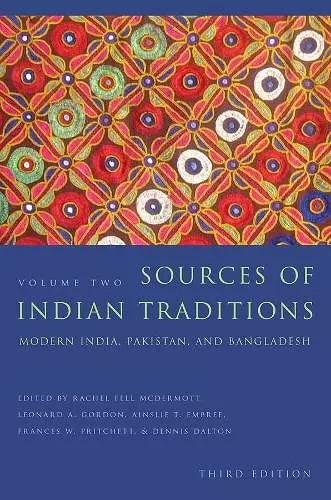Sources of Indian Traditions
Modern India, Pakistan, and Bangladesh
Ainslie T Embree editor Rachel Fell McDermott editor Dennis Dalton editor Leonard Gordon editor Frances Pritchett editor
Format:Hardback
Publisher:Columbia University Press
Published:16th May '14
Currently unavailable, and unfortunately no date known when it will be back

Volume 2 of Sources of Indian Traditions contains an essential selection of primary readings on the social, intellectual, and religious history of India from the decline of Mughal rule in the eighteenth century to today. It details the advent of the East India Company, British colonization, the struggle for liberation, the partition of 1947, and the creation of the nation-states of Pakistan, Bangladesh, and contemporary India. This third edition of Volume 2 begins earlier than the first and second, featuring a new chapter on eighteenth-century intellectual and religious trends that set the stage for India's modern development. The editors have added material on Gandhi and his reception both nationally and abroad and include different perspectives on and approaches to the partition and its aftermath. They expand their portrait of post-1947 India and Pakistan and add perspectives on Bangladesh. The collection continues to be divided thematically, with a section devoted to the drafting of the Indian constitution, the rise of nationalism, the influence of Western thought, the conflict in Kashmir, nuclear proliferation, minority religions, secularism, and the role of the Indian political left. These updates make Sources of Indian Traditions indispensable for courses in philosophy, religion, literature, and intellectual and cultural history.
Contains an essential selection of primary readings on the social, intellectual, and religious history of India from the decline of Mughal rule in the eighteenth century to today.For more than fifty years, students and teachers have made the two-volume resource Sources of Indian Traditions their top pick for an accessible yet thorough introduction to Indian and South Asian civilizations. Volume 2 contains an essential selection of primary readings on the social, intellectual, and religious history of India from the decline of Mughal rule in the eighteenth century to today. It details the advent of the East India Company, British colonization, the struggle for liberation, the partition of 1947, and the creation of Pakistan, Bangladesh, and contemporary India. This third edition now begins earlier than the first and second, featuring a new chapter on eighteenth-century intellectual and religious trends that set the stage for India's modern development. The editors have added material on Gandhi and his reception both nationally and abroad and include different perspectives on and approaches to Partition and its aftermath. They expand their portrait of post-1947 India and Pakistan and add perspectives on Bangladesh. The collection continues to be divided thematically, with a section devoted to the drafting of the Indian constitution, the rise of nationalism, the influence of Western thought, the conflict in Kashmir, nuclear proliferation, minority religions, secularism, and the role of the Indian political left. A phenomenal text, Sources of Indian Traditions is more indispensable than ever for courses in philosophy, religion, literature, and intellectual and cultural history.
The third edition of Sources of Indian Traditions is fascinating, easy to read, provocative, and relevant to the present. Two narrative lines flow, like an underground river, through the book: colonialism and the search for independence and the struggle with the ever-changing questions of nationalism. An excellent expansion of the second edition, this anthology is masterly organized, making it a unique teaching text on South Asia. -- Owen M. Lynch, New York University The third edition of Sources of Indian Traditions will assuredly be, like the earlier versions, an indispensable resource for teaching South Asia across a wide range of disciplines. The revisions are extensive and substantially reflect scholarly advances of recent years. Specialists and novices alike will learn from the texts that are included, and the organization and commentaries are bound to stimulate productive conversation and even controversy. -- Barbara D. Metcalf, University of California, Davis Anthologies come and go, and India becomes South Asia, but Sources of Indian Traditions remains the best-the best selected, best translated, and best annotated. It is to South Asian texts what the Oxford English Dictionary is to the English language: the gold standard. -- Wendy Doniger, University of Chicago
ISBN: 9780231138307
Dimensions: unknown
Weight: unknown
1024 pages
third edition